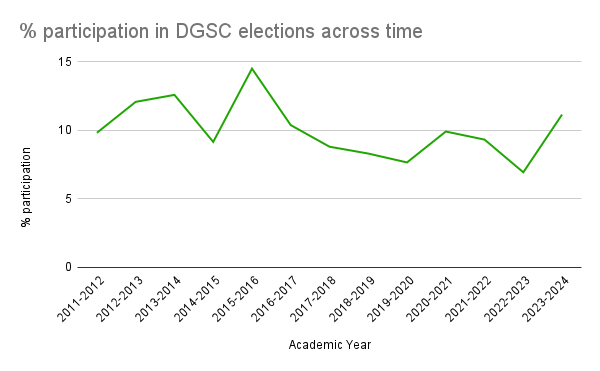This year student participation in the election was 11.15%. The DGSC Steering is thrilled because of this collective achievement. Here we tell you more about the election and the names of the elected representatives.
Our goal was to overcome the low 6.93% from last year’s election, which we thought was a consequence of covid virtual student life. We had a campaign to increase participation, which included the use of digital signage and also one all-student email stating clearly our interest in improving participation at the elections and the DGSC. Thus our original goal was to have at least 8% of participation this year.
In the end, we were surprised because we overpassed that goal with the best participation since 2015-2016. The DGSC holds the elections on eBallot, a software by VoteNet. The Co-Chair for Student Affairs prepared the following information using the data available on this resource to show the results of this year in relation to past elections:

DGSC Elections 2011-2024
| Academic Year | Total Students | Voted | % participation |
| 2011-2012 | 4480 | 440 | 9.82 |
| 2012-2013 | 4585 | 554 | 12.08 |
| 2013-2014 | 4542 | 572 | 12.59 |
| 2014-2015 | 4328 | 396 | 9.15 |
| 2015-2016 | 4233 | 614 | 14.51 |
| 2016-2017 | 3942 | 409 | 10.38 |
| 2017-2018 | 3567 | 314 | 8.8 |
| 2018-2019 | 3759 | 312 | 8.3 |
| 2019-2020 | 3372 | 258 | 7.65 |
| 2020-2021 | 3390 | 336 | 9.91 |
| 2021-2022 | 3315 | 309 | 9.32 |
| 2022-2023 | 3145 | 218 | 6.93 |
| 2023-2024 | 3032 | 338 | 11.15 |
To understand the results of the elections, it is important to know that we elect program representatives and at large representatives that are members of the DGSC plenary, which is the body that makes decisions on the DGSC budget and policies. We also elect other positions, all according to the DGSC Constitution and the DGSC Bylaws.
Programs elect one representative for each 100 or fewer students. A program with 101 students would have 2 representatives. In the election, the DGSC opens seats according to nominations, so there might be programs that can have two seats, but only open one during the election. The elected program representatives are the following students:
Program representatives
- Anthropology: Cassandra Barnes & Seyedeh Mehrnaz Moghaddam
- Art History: Forrest Pelsue
- Biochemistry: David Amoh Boateng
- Biology: Katherine Anderson & Shivani Sharma
- Business: Joseph Koons
- Computer Science: Bilal Abdulrahman & Jianing Qi
- Criminal Justice: Noah Cohen
- Digital Humanities: Zico Abhi Dey
- Economics: Khaled Eltokhy
- English: Christopher Buonanno & Samuel O’Hana
- History: Evan Rothman
- LAILAC: Melissa Martinez Ascanio
- Math: Susan Rutter
- Music: Anne Beliveau
- Philosophy: Naomi Hilas
- Physics: Alex Jiang & Yang Zhou
- Political Science: Jawanza Williams & Mary Madsen
- Psychology: Amour Castillo, Caraline Malloy & Kaile Smith
- Social Welfare: Ian Williams
- Sociology: Leanne Fan
- Theater: Philip Wiles
In addition to program representatives, we have at-large representatives, who represent the student body in general. There is one seat for every 200 students. This means that whatever program you are in, you can reach any of the following students to ask for help to bring your concerns to the DGSC plenary meetings:
At-large representatives:
- Adam Kocurek (History)
- Alireza Hashemi (Physics)
- Christopher Campbell (Comparative Literature)
- Daniel Okpattah (Biochemistry)
- Eric Barenboim (LAILAC)
- Jonathan Hanon (Computer Science)
- Joni Sebastiano (Biochemistry)
- Katherine Rivera Gomez (Biology)
- Kelsey Milian (Music)
- Nikita Meghani (Biology)
- Philip Asamani (Biochemistry)
- Samantha Delaney (Biochemistry)
- Sayantika Mondal (Math)
- Sean Apparicio (Philosophy)
- Sharanya Dutta (English)
- Sydney Harvey (Philosophy)
In addition to the program and at-large representatives, the DGSC elections include other leadership roles to represent students in different spaces. In this case, the elected students are not members of the DGSC plenary.
Academic Appeals Officers
- Computer Science: Jonathan Hanon
- Philosophy: Sean Apparicio
Student Elections Review Committee (SERC)
- Sean Apparicio (Philosophy)
- Sharanya Dutta (English)
- Silvia Rivera Alfaro (LAILAC)
- Sydney Harvey (Philosophy)
Faculty-Student Disciplinary Panel Representatives
- Adam Kocurek (History)
- Amruta Wagh (Psychology)
- Aria Walls (Biology)
- Cassandra Barnes (Anthropology)
- Sean Apparicio (Philosophy)
- Sydney Harvey (Philosophy)
Advocate Advisory Board
- DGSO member: Chiara Caputi (Comparative Literature)
- Current or former chartered org leader: Luis Escamilla Frias (LAILAC)
OpenCUNY Board Members
- Adam Kocurek (History)
- Christopher McGuiness (Music)
- Jonathan Hanon (Computer Science)
- Sydney Harvey (Philosophy)
In addition to the elections, we got two programs that petitioned pro tempore to appoint their Program Representatives:
- Classics: Nancy Coffey
- Comparative Literature: Daniel West
We definitely want more and more participation from all programs to serve the entire student community in a better way… and having a program representative gives access to the semester program allocation. Thus, if your program does not have a representative on this list, reach out to membership@cunydsc.org to find out how to start a petition!


